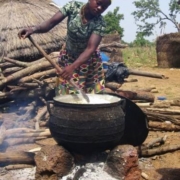Factoring Practicality into Cook Stoves

Would any manufactured stove that you know of work well for this woman? Maybe not?
Working with local women to design cooking solutions is not hard when the team is located in the project area. It’s only natural to include the user in developing the product. But when wood stoves are created by foreigners, that invaluable input easily goes missing and the stove, although technically fine, usually misses other necessary attributes. That’s why ARC tries to develop stoves in the field, while learning how fire works in the lab.
Researchers associated with the Regional Testing and Knowledge Center in Accra, Ghana might agree with this strategy. They recently published a paper in which 20 biomass cook stoves available in Ghana were evaluated for high-power thermal efficiency, low power specific consumption rate, turn down ratio, high power CO emissions, high power PM2.5 emissions, low power CO emissions, low power PM2.5 emissions, affordability, fuel saving potential, operations and maintenance cost, time saving, indoor CO, and indoor PM2.5 emissions.
The authors concluded that none of the cook stoves satisfied the conditions of all of the performance indicators. The forced draft stoves were generally high performing on the technical and environmental attributes, but low performing on the economic and social/public health metrics like affordability, maintenance and operation costs, and fuel saving potential. The more traditional stoves did not perform very well technically and environmentally but ranked highest economically, being more affordable than the cleaner burning alternatives like forced draft stoves.
Available natural draft stoves were a better alternative considering the economic, technical, and environmental attributes. The high cost of forced draft stoves (most are imported), their operation and maintenance cost, and the requirement of electricity resulted in adoption rates being low. The suitability to prepare Ghanaian staples, which require rigorous stirring, were also generally underestimated. Locally made natural draft stoves did not score well in terms of emissions but were much less expensive, did not require the preparation of fuel, and were made to prepare Ghanaian staple foods.
The study highlights the need to consider all the performance criteria simultaneously in order to choose the “best performing” stove.
The authors conclude with the hope that locally made stoves can be technically improved while maintaining the other necessary attributes. (Gloria Boafo-Mensah, et al., Biomass and Bioenergy 150, 2021).
It just so happens that our General Manager Sam Bentson is at the Regional Testing and Knowledge Center in Accra right now, working with Ms. Boafo-Mensah and the rest of the team on some exciting projects. We look forward to sharing Sam’s report about his trip when he returns!




Leave a Reply
Want to join the discussion?Feel free to contribute!